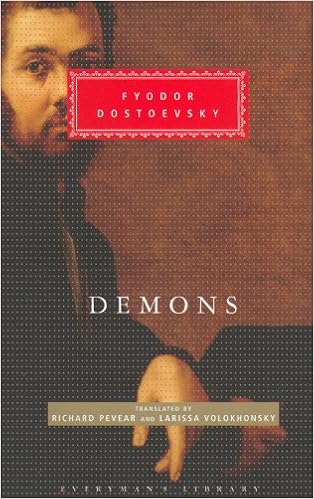Sadly, a great Russian novel I've failed to finish, although I did get about one third the way through.
The translation, by Richard Pevear and Larissa Volokhonsky, is as idiomatic, witty and sardonic as I imagine the author intended. The plot is not without topical interest: a provincial gathering of tame political radicals in the mid-1860s is "invaded" by a small group of nihilist extremists who shrink from no destructive act (including murder) in their struggle against the establishment. The social setting is Jane Austen's: the lower gentry, sandwiched between the serfs (peasantry) and the upper aristocracy.
It's true that the infamous Russian names are a bit of a trial. The author wields a large cast who are frequently referred to by differing subsets of their entire names - it's easy to fail to recognise that differently-named individuals are sometimes the same person .. which quite derails things.
The Wikipedia article explains why Dostoevsky wrote Demons:
"Set in the 1860s, Demons is an allegory of the potentially catastrophic consequences of the political and moral nihilism that were becoming prevalent at that time in Russia. A provincial town descends into chaos as it becomes the focal point of an attempted revolution, orchestrated by master conspirator Pyotr Verkhovensky. The mysterious aristocratic figure of Nikolai Stavrogin — Verkhovensky's counterpart in the moral sphere—dominates the book, exercising an extraordinary influence over the hearts and minds of almost all the other characters. The idealistic, western-influenced generation of 1840s Russia, epitomized in the character of Stepan Verkhovensky (who is both Pyotr Verkhovensky's father and Nikolai Stavrogin's childhood teacher), are presented as the unconscious progenitors and helpless accomplices of the 'demonic' forces that take possession of the town.So where was my problem?
According to Ronald Hingley, Demons is Dostoevsky's "greatest onslaught on Nihilism" and constitutes "an awesome, prophetic warning which humanity...shows alarmingly few signs of heeding." He describes it as "one of humanity's most impressive achievements—perhaps even its supreme achievement—in the art of prose fiction."
Well, I'm not reading this novel for a course or for an exam but for fun. Dostoevsky writes at an incredibly fine texture (I almost said Proustian); pages are set aside for this meeting or that social call or those events outside a Mass. Painstaking detail serves to build the fabric of time and place, character and back story. Much of it is not without interest, but the plot proceeds at a glacial pace.
I can understand that the author's contemporaries would have been able to immerse themselves in all this scene-setting, just as Jane Austen's readers happily cross-checked her social scenes with their own experiences. One hundred and fifty years later, the past is another country and the whole thing is just slow.
A piece of advice for anyone setting out with a little more determination: the Wikipedia article has a summary of plot and characters which can help considerably in disentangling the early chapters. You're not a mid-19th century Russian, you don't know all this stuff by upbringing - and it will help. In the end, you don't read Dostoevsky as a whodunit thriller.
